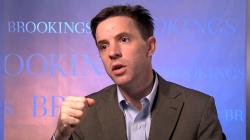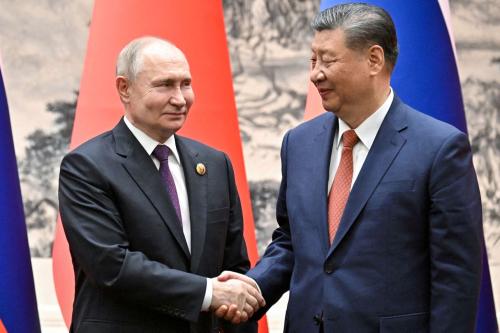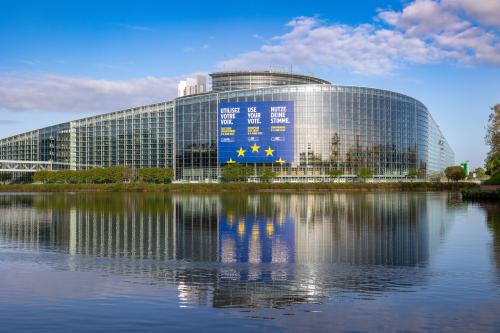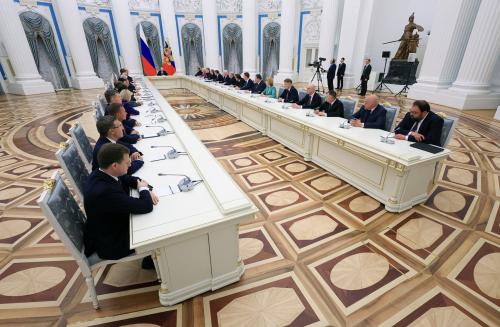Paper commissioned by CSIS for the 3rd CSIS US-France Bilateral Dialogue, Washington DC and Annapolis, MD, Nov. 16-18, 2007.
Note: This paper will be updated based on the discussions of this US-France dialogue and will be published as a CSIS Initiative for a Renewed Transatlantic Partnership report in early 2008
It would be an understatement to say that France and the United States have not always seen eye-to-eye with each other on the Arab-Israeli conflict. Indeed, this issue has caused some of the most vitriolic diplomatic disputes between Paris and Washington of the last decades, especially in the 1970’s.
More recently, however, the scope of disagreement has tended to narrow, and has given way to increased understanding and cooperation. This was certainly the case during the Oslo Peace Process years (1993-2000), this was largely the case during the first few months of the Road map initiative undertaken by the Quartet (2003), and this has also been the case in the recent months, with the efforts led by Secretary of State Condoleezza Rice to revive the dialogue between the two parties. As a symbol of this convergence, French Foreign Minister Bernard Kouchner recently offered to host a donors’ conference in Paris to complement the peace conference scheduled to take place in Annapolis later this month.
Does this mean that France and the US are now in complete agreement on this issue? Does the replacement of President Jacques Chirac by Nicolas Sarkozy – who did not hesitate to trumpet his friendship not only for the US, but for Israel as well, during the presidential campaign – usher in a new era of agreement on the Arab-Israeli conflict? If there are reasons to be optimistic, expectations should not get out of hand, as divergences in analysis and interests remain, and the situation on the ground is, in any case, both messy and worrying. Before getting to the specifics of agreements and disagreements between France and the United States, it is useful to review the events of the past few years from a Franco-American perspective.
From the Peace process to the Road Map
The “hands-off” approach adopted by the Bush administration toward the Israeli-Palestinian conflict – a strong contrast with the policy of its predecessor – was a cause of great concern in Paris. In spite of the short-lived hope generated by the Road Map, French-US perceptions of the Middle East have been marked by divergence, on three issues at least.
First, the primacy of the Israeli-Palestinian peace process for the whole region, a strongly held view in Paris, was disputed by the Bush administration. Many inside this administration considered other regional problems as more critical – especially, it soon turned out, the lack of freedom and democracy, most notably in Iraq. “The road to Jerusalem goes through Baghdad”, rather than the reverse French view, was the slogan encapsulating this argument in 2002-2003, with the hope that regime change in Iraq would “serve as a dramatic and inspiring example of freedom for other nations in the region,” including the Palestinians, in the words of President Bush in February 2003.
The second issue was the conceptual link established by the Bush administration between Al Qaeda and Palestinian terrorist groups, in the context of a “global war on terror” in which the US, Israel, and the rest of the civilized world faced the a single, monolithic enemy. Seen from Paris, if terrorism from any source is always to be strongly condemned, this view was analytically wrong and politically damaging. In contrast to Al Qaeda, with which it is not possible to negotiate anything, Palestinians have legitimate political objectives, and the strategy should be to dissociate the terrorists or armed branch from the moderates or political branch – with which a settlement will ultimately be found. By lumping Al Qaeda and Palestinians together, the “global war on terror” de-legitimizes Palestinian claims and ultimately plays into the hands of the radicals.
The third issue is closely related to the second, and has to do with the strength of the Palestinian leadership. Paris had supported Yasser Arafat in the past, certainly not because he was a flawless leader, but out of conviction that lasting peace could only be achieved through direct talks between the two enemies recognizing each other’s existence and legitimacy. Ariel Sharon’s siege of Arafat’s Ramallah headquarters in 2001-2002, George W. Bush’s prerequisite that Yasser Arafat goes away before anything happens, the lack of support for Mahmoud Abbas when he succeeded Arafat, the unilateral nature of Sharon’s withdrawal from Gaza, the insistence that Palestinians hold free and fair elections in January 2006 but the refusal to accept the consequences of their outcome: all these decisions gave the impression that Israel, the United States and, sometimes, the international community, were ready to take Palestinians seriously only if they underwent radical change to their liking. The problem is that in order to have a peace process, you need a moderate, solid and legitimate Palestinian leadership to negotiate with – but in order to get this kind of leadership, you need a peace process.
Since 2001, many episodes have illustrated these differences in views.
The building of the West Bank barrier, while justifiable on security grounds, was criticized by Paris and the international community, and to a much lesser extent by the US, in as much as it did not go along the Green Line (the 1949 Armistice Line) but cut into the West Bank, and reduced Palestinians’ ability to move around, work or cultivate their fields, thereby radicalizing many.
While George W. Bush accepted Sharon’s unilateral disengagement plan from Gaza in 2004-2005, Paris and the EU as a whole were ambivalent at first, not only as a matter of principle (peace cannot be achieved unilaterally, and priority should be given to the Road Map), but also out of concern that this could impede the peace process for many years and lead to an acceleration of construction of settlements in the West Bank, as comments by Dov Weisglass, a senior aide to Sharon – and subsequent developments since 2005 – have seemed to confirm. However, France and the EU, inside the Quartet, gradually warmed up to the idea and supported it, provided this would be a first step towards a more permanent settlement of the Israeli-Palestinian conflict.
Reaction to Hamas victory in January 2006 was as firm in Paris as it was in Washington. The Quartet asked the new government to recognize Israel as one of the preconditions for continuing development aid. Paris, however, while considering Hamas to be a terrorist organization, holds that it can change in the future – as the PLO did in 1989 – and possibly become, once it has recognized Israel and renounced terrorism, a party to negotiate with, while – despite statements to the contrary — Washington acts as if it did not consider this possible.
When the war in Lebanon broke out in July 2006, Washington expressed its tacit support, hoping that Hezbollah would be significantly weakened. Paris was more doubtful on this point, and feared that a disproportionate reaction would have terrible effects on the population of Lebanon as a whole. To take the Israeli concern into account, Paris and other European capitals took the lead in reinforcing the UNIFIL to better act as a buffer force in Southern Lebanon, under UNSC 1701.
Franco-American divergences and convergences today
Is Nicolas Sarkozy’s view of the region very different from that of Jacques Chirac? The two men don’t belong to the same generation, and they certainly don’t have the same personal ties and experience in the region. In contrast with Chirac’s old friendships with many Arab leaders, Nicolas Sarkozy has made clear that he is a friend of Israel – and he is celebrated as such in Tel Aviv and in Washington.
However, a closer look reveals that during the campaign, Nicolas Sarkozy used the same rhetorical device he used vis-à-vis the US, namely “I am a friend of the US / of Israel… but real friends tell real friends what they think”. And what he thinks does not necessarily coincide with what Americans and / or Israelis would like to hear. For example, he described Israel’s war against Hezbollah in the summer of 2006 as “clumsy and disproportionate”, the exact code words used by the Quai d’Orsay. It should be noted, moreover, that starting with the recommendations of a blue-ribbon group of experts in 2002, aggressive steps have been taken under Jacques Chirac to improve Franco-Israeli relations (after all, there are more than 800,000 Francophones in Israel, France is the 6th largest trading partner of Tel-Aviv, and people-to-people exchanges are extremely dense), resulting in a marked improvement of diplomatic ties, symbolized by frequent high-level and successful visits of Prime Ministers Sharon then Ehud Olmert in the past two years. Since he took office in May 2007, Nicolas Sarkozy has not noticeably changed France’s stance in the region, and has – so far – followed in the footsteps of Jacques Chirac.
So if Sarkozy has not substantially altered French foreign policy, what are the current points of agreement and disagreement between the US and France on the Arab-Israeli conflict?
- At base, there is a strong French-US agreement on the question of security for Israel and condemnation of Palestinian terrorism.
- The convergence on Iran has been remarkable. Nicolas Sarkozy has been vocal in stating that an Iranian nuclear bomb was not acceptable, but Jacques Chirac, before him, had taken a hard line on Iran. This brings the question of the Shia – Sunni rift which has come to dominate the region, whether in Iraq, in Lebanon, or indirectly in the Palestinian territories. On the necessity to contain radical Iranian influence in all of these places, and work with the traditional regional allies, Paris and Washington are in agreement.
- The fate of Lebanon and the adoption of a hard line on Syria was, in 2004, one of the first issues on which France and the US resumed active cooperation, with UNSC resolution 1559 and, in May 2006, resolution 1680.
There also remain enduring French-US differences.
- As mentioned above, Paris is convinced that peace can only come through a process of negotiations between the two enemies, which means that moderate Palestinian leaders such as Mahmoud Abbas should not be sidestepped, and that they should be helped – and not only a few months before the elections, as was seen in the past. Too often in the recent years, Palestinian leaders have been criticized or undercut, especially by the US Congress, and this has been detrimental to the peace process. This rationale is behind France’s proposal to host a donors’ conference in Paris later this year. The conference will be presided over by Tony Blair, the special envoy of the Quartet, who shares this goal of reinforcing Mahmoud Abbas and Prime Minister Salam Fayyad. It is crucial that Mahmoud Abbas be reinforced not only in the donors conference, but in Annapolis as well – a failure to do so would only comfort Hamas, which controls Gaza since June 2007 and is threatening Abbas’s rule in the West bank.
- Another aim of the Paris conference is to provide more help to the Palestinian population, who has suffered greatly in recent years, especially in Gaza, where the situation is now close to a humanitarian catastrophe. Paris voices its concern more often than Washington on this issue, and has been providing substantial financial and humanitarian help along with the EU throughout the recent years, because increasing poverty and despair can only lead to further radicalization and embrace of Hamas. Thus for example the Quai d’Orsay reacted negatively on October 29, 2007, when Israeli sanctions against civilians in the Gaza strip (on electricity and fuel supplies) were tightened.
- The Bush administration now advocates the creation of a Palestinian state, while France always insists that it must be a viable Palestinian state, not a patchwork of remote pieces of land. France has been much more vocal than Washington about the uninterrupted growth of illegal settlements in occupied territory, especially in East Jerusalem, which will make a final peace agreement more difficult and threaten the viability of the future state. Of particular concern has been the Maale Adounim settlement and the “E1 zone” project, which separates the Northern from the Southern West Bank. Indeed, on November 18, 2007, while traveling to the region, Bernard Kouchner declared that “colonization is not only contrary to law, it is also the main obstacle to peace from a political point of view.”
- The last disagreement has to do with Lebanon. While there is real convergence on this issue, as previously mentioned, France is more concerned with issues of Lebanese domestic politics, while Washington seems more focused on countering Syria there. A good example of this disagreement can be found in the attitude towards Hezbollah, which Washington considers only as a terrorist organization, and which Paris sees also as a political force in Lebanese politics that must be reckoned with. This is why Bernard Kouchner and Nicolas Sarkozy included Hezbollah in the talks at La Celle-Saint-Cloud in July 2007 (aiming at fostering a solution to the political deadlock), a move that triggered an angry letter from the US Congress to Nicolas Sarkozy, authored by Rep. Robert Wexler and signed by 91 of his colleagues. In the recent months, a special advisor to Bernard Kouchner, Jean-Claude Cousseran, and two special representatives of President Sarkozy, Claude Guéant and Jean-David Lévitte, were sent to Damascus to discuss the coming presidential elections.
- A word about perceptions to complete the picture. Enduring stereotypes persist in both countries about the other country’s stance on the conflict. For example, the French tend to believe that the US and Israel are always in agreement, while the situation is much more conflictual – it is actually often frustrating, as viewed from Washington. The pro-Israeli lobby is sometimes credited with more influence than it has. Americans, on their part, tend to think that France is reflexively pro-Palestinian, they sometimes distrust French sentiments vis-à-vis the security of Israel, and they ignore the depth and quality of the relationship between Paris and Tel-Aviv.
To conclude, there is no doubt that renewed engagement on the part of the Bush administration has been welcomed by Paris and the EU in general, which can more easily associate itself with this policy. As Nicolas Sarkozy said to the US Congress on November 7, 2007: “To the Israeli and Palestinian leaders I say this: Don’t hesitate! Risk peace! And do it now! The status quo hides even greater dangers: that of delivering Palestinian society as a whole to the extremists that contest Israel’s existence.”



